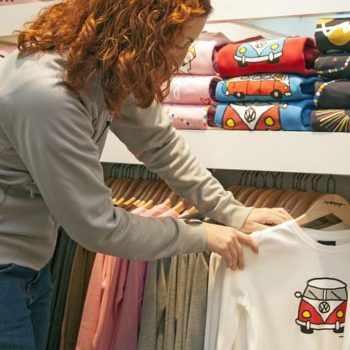Why Brands Need to Become Friends with Their Customers
by Hugh Williams on 11th Jan 2018 in News

It’s easy to know exactly how to treat a close friend, because you know them inside out. Not only do you know the basics like name, age, location – you also recognise what they already have, what they don’t have but want, why they prefer one item to another, what annoys them and a whole plethora of other minute details that influence their purchasing decisions. Writing exclusively for RetailTechNews, Mike Shaw, VP, EMEA, dataxu (pictured below), here discusses the importance of using insights to buddy up with clients to maintain a competitive advantage.
If brands today want to maintain a competitive advantage, they have to really get to know their customers and get to know their personal buying quirks to understand what makes them tick.
Have a nice day!
Service with a smile isn’t exactly a new concept – if you want to build consumer loyalty, you have to make the purchase experience as pleasant as possible. And yet, despite nine out of ten marketers believing that customer experience is a key differentiator in consumer behaviour according to tech researcher Gartner, many UK retailers are yet to take this approach to heart.
American companies consistently outperform their UK counterparts, with as many as 92% of British shoppers saying they’ve experienced poor service in a survey by Censuswide and Magnetic North. These dissatisfied shoppers aren’t just settling for the subpar service – they’re taking their business elsewhere and buying from competitors.
As retail grows ever more competitive both on and offline, marketers need to get better at attracting, engaging, and retaining consumers – and they should start by putting their customers first.
Customers take centre stage
Thanks to the internet, news travels fast. Consumers can browse shoes, clothing, and electronic devices from bed when they wake up, on their daily commute, or watching TV after work on the sofa. They can also make purchases, request refunds, and read scores of online reviews, both positive and negative.

Mike Shaw, VP EMEA, dataxu
Being able to access firsthand knowledge about brands and their competitors in an instant has resulted in more knowledgeable and empowered consumers than ever before. Furthermore, they assume that retailers will really try to get to know them to provide personalised and seamless shopping experiences throughout the consumer lifecycle.
Modern consumers expect brands to know who they are and to customise their marketing efforts accordingly. In fact, they are so enthusiastic about personalisation, they’re increasingly willing to give brands their data in exchange for it, according to the State of the Connected Customer report. Companies looking to stand out from the ever-growing crowd need to put their consumers front and centre by crafting relevant and seamless one-to-one experiences to attract new customers and boost brand loyalty.
Identify and entice new customers
The general ennui that British shoppers have for customer service provides a rich opportunity for retailers looking to entice and impress new clientele. Today’s consumers leave hefty online footprints that reveal a lot about their interests and preferences so retailers needn’t reach out blindly. By harnessing a comprehensive data analytics approach, brands can collect and analyse this data and identify potential consumers.
For example, a retailer specialising in outdoor apparel can detect individuals who have previously begun – and perhaps abandoned – an online purchase on a competitor’s website. They can then use this data to craft one-to-one marketing experiences. If an individual was browsing high-tech rain jackets, the savvy retailer could reach out and suggest they take a look at their new range of waterproof gear, pointing out their improved features. In this way, retailers can set themselves apart from the competition by identifying potential consumers and attracting their attention with personalised advertising.
Keep your customers close…
However, the work isn’t done yet. Once a retailer has attracted new consumers with highly personalised ads, they must continue to keep customers engaged and unlikely to turn to a competitor by using personalisation and seamless experiences throughout the customer journey. Let’s say the 'outdoorsy' individual in the previous example finally buys a new waterproof rain jacket. The adventure brand can build a friendly, loyal relationship by offering personalised follow-up recommendations or special discounts.
Moreover, retailers can use the power of data analytics to make sure they’re delivering these suggestions and promotions to the same individual across different devices. In our example, the retailer could send a short adventure video to someone while they are sitting at home browsing on a tablet, followed by a quick banner ad when they are looking at their mobile phone at work.
Furthermore, by analysing campaign performance, retailers can make iterative improvements to their marketing, such as segmenting their audience further to boost results or avoiding non-responsive consumers to eliminate waste.
…then bring them closer
The trick is for brands to continue to employ personalisation creatively throughout the entire consumer lifecycle and build a healthy 'friendship'.
Although shopping habits show that digital marketing should remain at the forefront of advertising efforts, retailers can also integrate their digital strategy with real-life consumer behaviours by focusing on customer-centricity. Getting consumers to visit physical stores is a big ask, especially when customers today can find just about anything they want online; but brands can use their digital prowess to craft personalised in-store retail experiences as well. Talking to customers across a range of devices and based on their physical location is crucial to bridging the gap between the online and offline worlds. The internet is great for staying in touch, but it’s a sign of true friendship to visit occasionally.
So, while the world of retail may be getting more complex and more competitive, retailers now have the tools at their disposal to differentiate themselves from the competition. By designing and launching a strong digital marketing strategy, informed by tailored data analytics, retailers will bring in more business, boost brand loyalty, and maintain a strong, ongoing friendship.This content was originally published in RetailTechNews.








Follow ExchangeWire